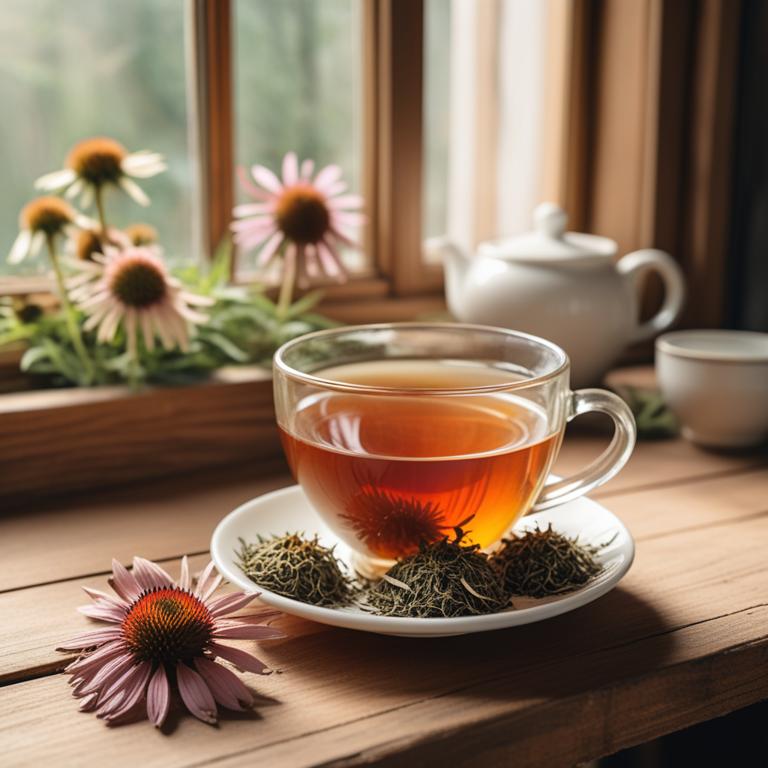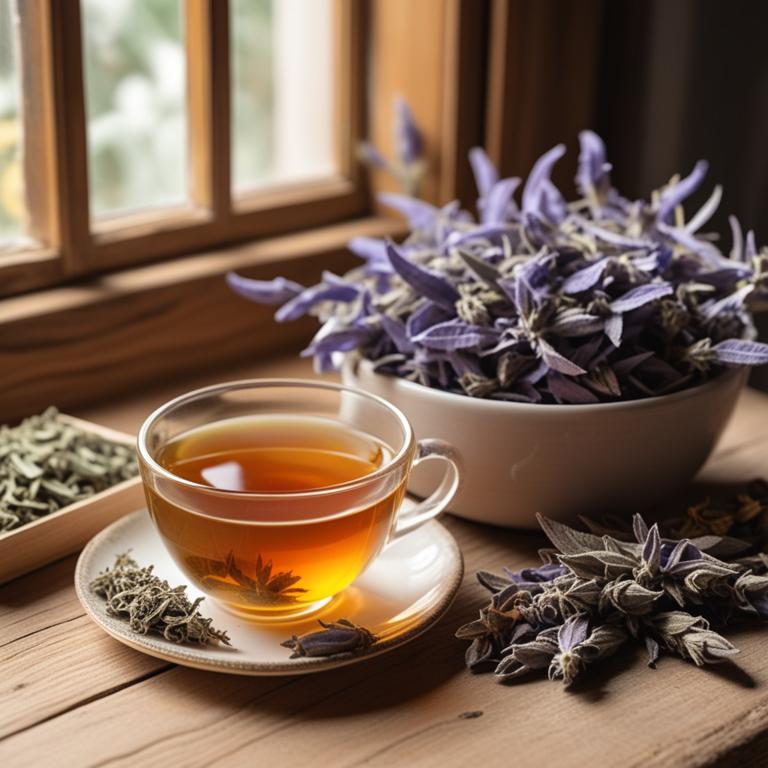10 Herbal Teas For Sore Throat

Herbal teas can be a big help when you have a sore throat.
These teas work by soothing the throat and reducing inflammation. They do this by releasing compounds that calm the throat muscles and reduce swelling. This makes it easier to swallow and talk. Echinacea purpurea is one of the herbs used in sore throat teas. It has anti-inflammatory properties that help reduce swelling and fight off infections. Glycyrrhiza glabra, or licorice root, is also commonly used. It contains a compound called glycyrrhizin, which helps reduce inflammation and soothe the throat.
Zingiber officinale, or ginger, is another herb often used. It has anti-inflammatory properties and can help reduce pain and discomfort. Drinking herbal teas for a sore throat can bring some real benefits to your life. For one, it can help you feel better faster. When you're not in pain, you can get back to your normal routine. This can be especially helpful if you have work or school to get to. Additionally, herbal teas can help you avoid harsh chemicals and medications. Many people prefer to use natural remedies when possible, and herbal teas fit the bill.
They can also be a comforting and relaxing way to take care of yourself when you're not feeling well.
- 1. Echinacea purpurea
- 2. Glycyrrhiza glabra
- 3. Zingiber officinale
- 4. Eucalyptus globulus
- 5. Lavandula angustifolia
- 6. Echinacea angustifolia
- 7. Sambucus nigra
- 8. Achillea millefolium
- 9. Salvia officinalis
- 10. Mentha x piperita
1. Echinacea purpurea

Echinacea purpurea teas contains a range of bioactive constituents, including alkylamides, caffeic acid, and chicoric acid.
These compounds have anti-inflammatory properties that can help reduce swelling in the throat, making it easier to swallow and speak. The antiviral properties of caffeic and chicoric acids can also help combat the underlying viral infections that cause sore throats. Additionally, the alkylamides in Echinacea purpurea teas have been shown to boost the immune system, which can help the body fight off the infection more effectively.
By reducing inflammation and supporting the immune system, Echinacea purpurea teas can provide relief from a sore throat.
- Gather 2 tablespoons of dried Echinacea purpurea root and flowers.
- Heat 1 cup of water in a pot.
- Add the dried Echinacea purpurea root and flowers to the pot.
- Steep for 5-7 minutes, then strain the mixture.
- Drink the tea while warm, up to 3 times a day for sore throat relief.
2. Glycyrrhiza glabra

Glycyrrhiza glabra teas contains compounds like glycyrrhizin and flavonoids, which have anti-inflammatory properties that help soothe a sore throat.
The saponins in the tea have a protective effect on the mucous membranes, reducing swelling and discomfort. Glycyrrhizin has also been shown to have a relaxing effect on the muscles, helping to calm spasms in the throat. The combination of these compounds works together to provide quick relief from a sore throat, making Glycyrrhiza glabra teas a popular choice for throat problems.
The anti-inflammatory and anti-bacterial properties of the tea help to reduce inflammation and fight off infections that can cause a sore throat.
- Gather 1 teaspoon of dried Glycyrrhiza glabra root and 1 cup of boiling water.
- Steep the root in the boiling water for 5-7 minutes.
- Strain the mixture into a cup using a tea strainer or cheesecloth.
- Add 1 tablespoon of honey (optional) to the tea for taste and soothing effect.
- Drink the tea while it's warm, 2-3 times a day, to help soothe a sore throat.
3. Zingiber officinale

Zingiber officinale teas contains a compound called gingerol, which is known for its anti-inflammatory properties.
These properties help reduce swelling in the throat, making it a popular remedy for sore throats. Gingerol also has antimicrobial properties, which help fight off infections that can cause a sore throat. Additionally, Zingiber officinale teas contain shogaol, a bioactive compound that has been shown to have pain-relieving properties.
By reducing inflammation, fighting off infections, and relieving pain, Zingiber officinale teas can help soothe a sore throat.
- Gather 1 cup of water and 1 tablespoon of grated Zingiber officinale (ginger root) in a saucepan.
- Heat the water over low heat until it starts to boil.
- Add the grated ginger to the boiling water and reduce heat to a simmer.
- Let the mixture simmer for 5-7 minutes, allowing the ginger flavor to infuse into the water.
- Strain the mixture into a cup and let it cool down before drinking it as a tea.
Zingiber Officinale Tea on Amazon
FGO Organic Ginger Tea, 100 Count, Eco-Conscious Tea Bags, Caffeine Free, Packaging May Vary (Pack of 1)
Disclaimer: We earn a commission if you click this link and make a purchase at no additional cost to you.
4. Eucalyptus globulus

Eucalyptus globulus teas contains the bioactive constituents eucalyptol and alpha-pinene.
These compounds have decongestant and anti-inflammatory properties that help to reduce swelling in the throat, making it easier to swallow. Eucalyptol also has antimicrobial properties that can help to combat infections that cause sore throats. The anti-inflammatory properties of alpha-pinene can also help to soothe and calm the mucous membranes in the throat, reducing pain and discomfort.
Drinking Eucalyptus globulus teas can provide quick relief from a sore throat by reducing swelling and fighting off infections.
- Get 1 cup of boiling water in a kettle or pot.
- Measure 2 tablespoons of dried Eucalyptus globulus leaves.
- Add measured leaves to a tea infuser or a heat-resistant cup.
- Pour boiling water over the leaves and let it steep for 5-7 minutes.
- Strain the tea and drink while warm to soothe a sore throat.
5. Lavandula angustifolia

Lavandula angustifolia teas contains several bioactive constituents that make it beneficial for soothing a sore throat.
The tea is rich in linalool and linalyl acetate, which are known for their anti-inflammatory and antimicrobial properties. These compounds help reduce swelling and fight off the bacteria that can cause infections in the throat. The tea also contains apigenin, a flavonoid that has anti-inflammatory properties and can help calm the throat.
When consumed, these compounds work together to provide relief from a sore throat and promote a faster recovery.
- Gather 1 cup of fresh Lavandula angustifolia flowers or 2 teaspoons of dried flowers.
- Heat 1 cup of boiling water in a kettle or pot.
- Add the Lavandula flowers to a tea infuser or directly to the boiling water.
- Steep for 5-7 minutes, then strain the tea into a cup.
- Drink the tea 2-3 times a day to help soothe a sore throat.
6. Echinacea angustifolia

Echinacea angustifolia teas contains bioactive constituents like alkylamides, glycosides, and phenolic acids.
These compounds have anti-inflammatory and antioxidant properties. Alkylamides help reduce swelling and pain in the throat, while glycosides have antimicrobial properties that prevent infections. Phenolic acids also have anti-inflammatory effects that soothe the throat and reduce discomfort.
By combining these properties, Echinacea angustifolia teas can provide relief from sore throat symptoms and promote a healthy recovery.
- Gather 2 tablespoons of dried Echinacea angustifolia root.
- Measure 1 cup of boiling water in a pot.
- Add the 2 tablespoons of dried Echinacea angustifolia root to the boiling water.
- Reduce heat and let it simmer for 5-7 minutes.
- Strain the tea and drink while warm to help soothe a sore throat.
7. Sambucus nigra

Sambucus nigra teas contains flavonoids, particularly quercetin and kaempferol, and glycosides like sambunigrin and sambunigron.
These compounds have anti-inflammatory properties that help reduce swelling and pain in the throat. The flavonoids also have antioxidant properties, which protect the throat tissues from damage caused by free radicals. The glycosides in Sambucus nigra teas have antiseptic and antibacterial properties, helping to combat infections that can cause sore throats.
By reducing inflammation, fighting infections, and protecting tissues, Sambucus nigra teas helps to soothe and heal a sore throat.
- Gather 1 cup of fresh Sambucus nigra flowers or 2 teaspoons of dried flowers.
- Combine the flowers with 1 cup of boiling water in a heat-resistant cup or teapot.
- Let it steep for 5-7 minutes, then strain the mixture into another cup.
- Add honey to taste, if needed, and mix well.
- Drink the tea 2-3 times a day to help soothe a sore throat.
8. Achillea millefolium

Achillea millefolium teas contains flavonoids, sesquiterpenes, and volatile oils, which work together to soothe a sore throat.
The flavonoids, particularly kaempferol and quercetin, have anti-inflammatory properties that help reduce swelling and pain in the throat. The sesquiterpenes, such as achillin and dihydroachillin, have antimicrobial properties that help combat infections and reduce inflammation. The volatile oils, including camphor and borneol, have a cooling effect that helps numb the pain and reduce discomfort in the throat.
By combining these properties, Achillea millefolium teas can provide quick relief for a sore throat.
- Gather 1 cup of fresh Achillea millefolium leaves, flowers, and stems.
- Wash the herbs with cold water, then pat them dry.
- Use a tablespoon to measure 1 tablespoon of the dried herbs (or 2 tablespoons of fresh herbs).
- Steep the herbs in a cup of boiling water for 5-7 minutes. Then, strain the liquid.
- Drink the tea 2-3 times a day to help soothe a sore throat.
9. Salvia officinalis

Salvia officinalis teas contains rosmarinic acid, a potent antioxidant that helps reduce inflammation in the throat.
This herb also contains carnosic acid and carnosol, which have antimicrobial properties that combat the bacteria that cause infections. The anti-inflammatory properties of Salvia officinalis teas help soothe and calm the throat, reducing discomfort and pain. Additionally, the herb's expectorant properties help loosen and clear mucus, making it easier to swallow and relieving congestion.
By reducing inflammation and combating infections, Salvia officinalis teas provides quick relief from sore throats.
- Gather 1 cup of fresh or dried Salvia officinalis leaves.
- Measure 1 tablespoon of the leaves and place them in a tea infuser or a small muslin bag.
- Heat 1 cup of boiling water in a pot.
- Steep the Salvia leaves in the boiling water for 5-7 minutes.
- Strain the tea and drink it while it's still warm to soothe a sore throat.
10. Mentha x piperita

Mentha x piperita teas contains bioactive constituents like menthol, menthone, and limonene that work together to help soothe a sore throat.
Menthol has a cooling effect that reduces swelling and eases pain, while menthone has antibacterial properties that help fight off infections. Limonene, on the other hand, has anti-inflammatory properties that reduce redness and swelling in the throat. When you drink Mentha x piperita tea, the menthol and menthone are absorbed into the bloodstream and then released into the throat, where they can help calm the irritation and discomfort.
This makes Mentha x piperita tea a popular natural remedy for people with a sore throat.
- Gather 1 cup of fresh peppermint leaves (Mentha x piperita) or 1 teaspoon of dried peppermint.
- Heat 1 cup of water in a pot until it boils.
- Add the fresh or dried peppermint to the boiling water and reduce heat to a simmer.
- Let the peppermint steep in the water for 5-7 minutes, then strain the leaves from the liquid.
- Drink the peppermint tea while it is still warm, 2-3 times a day to help soothe a sore throat.